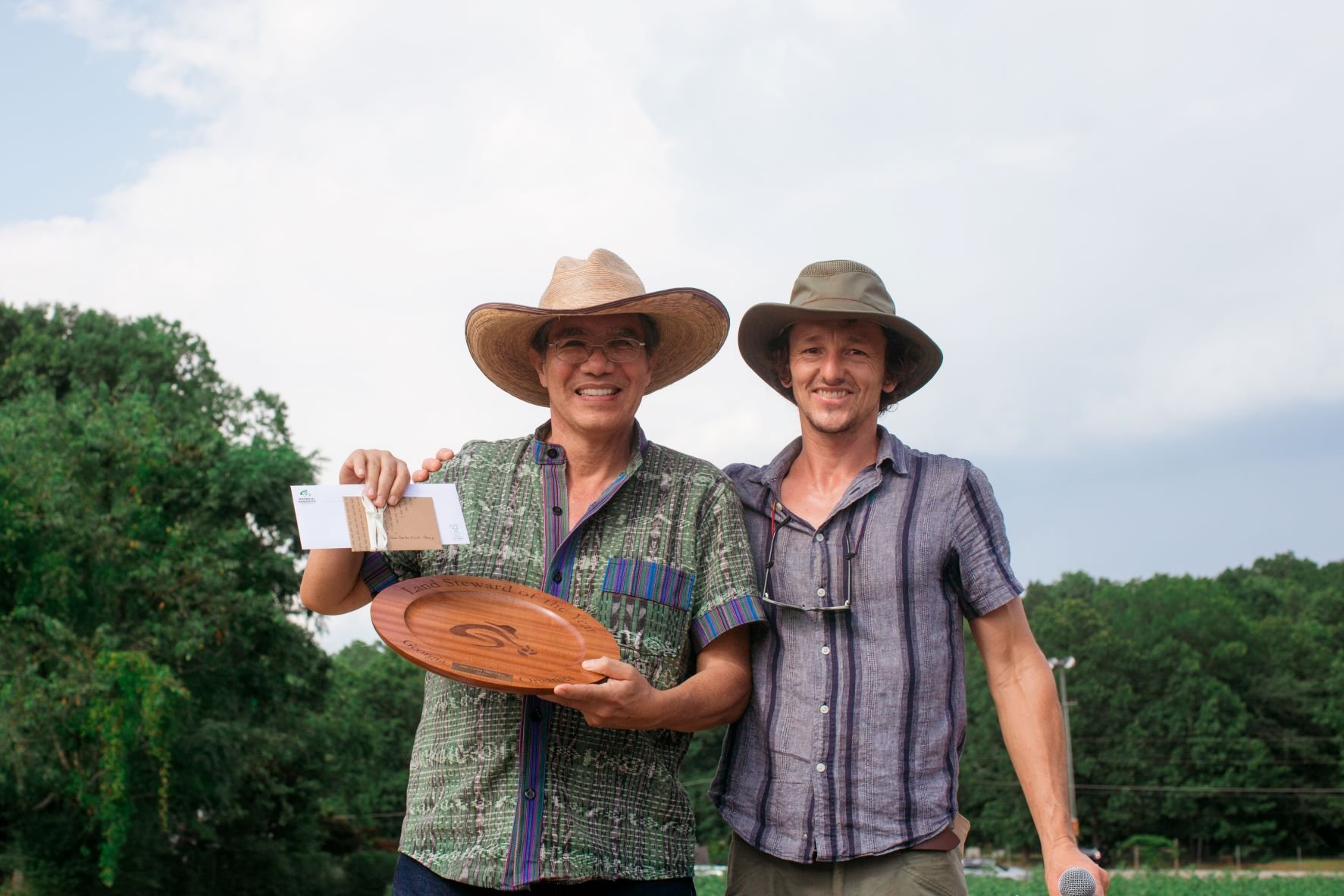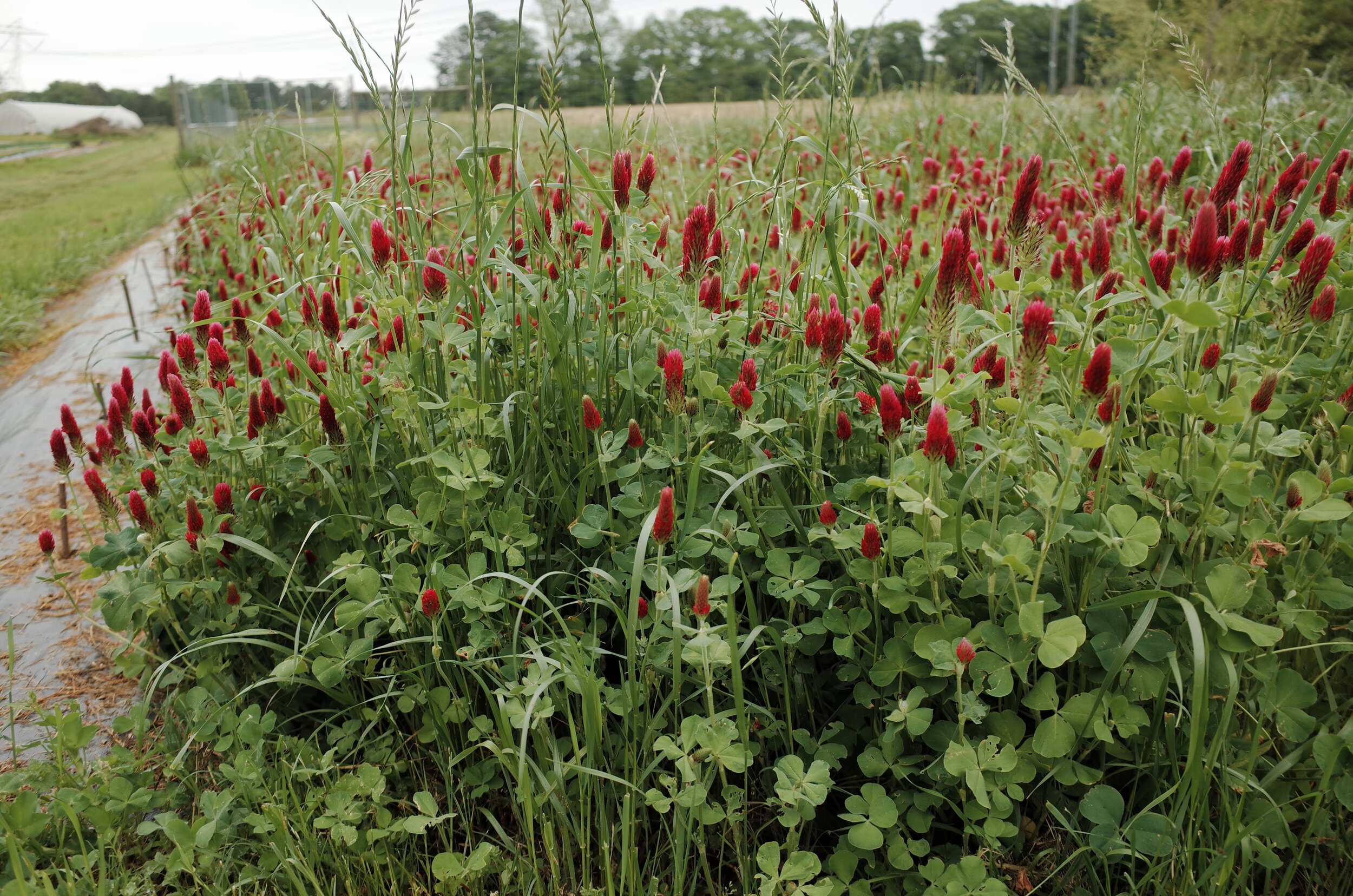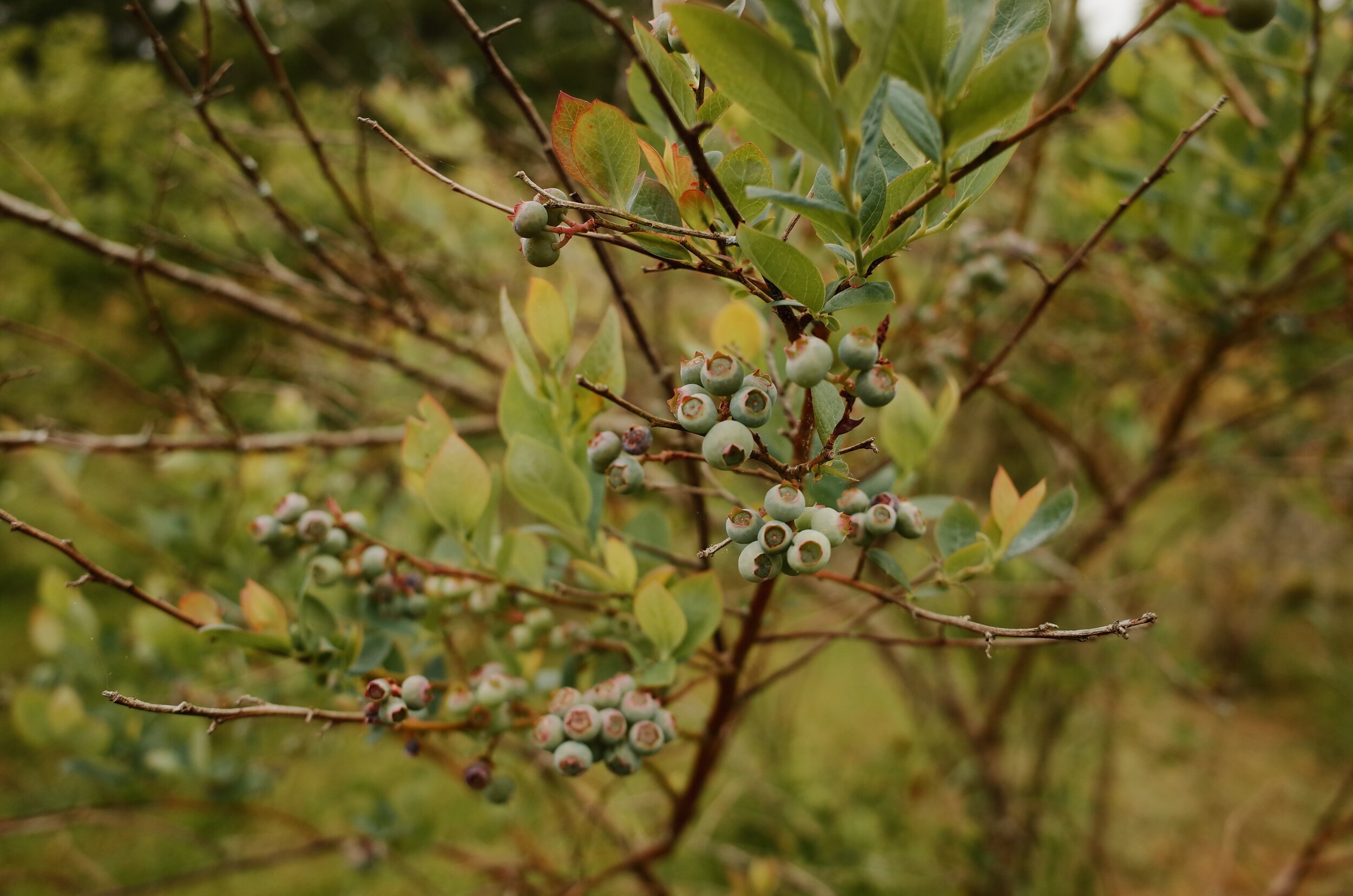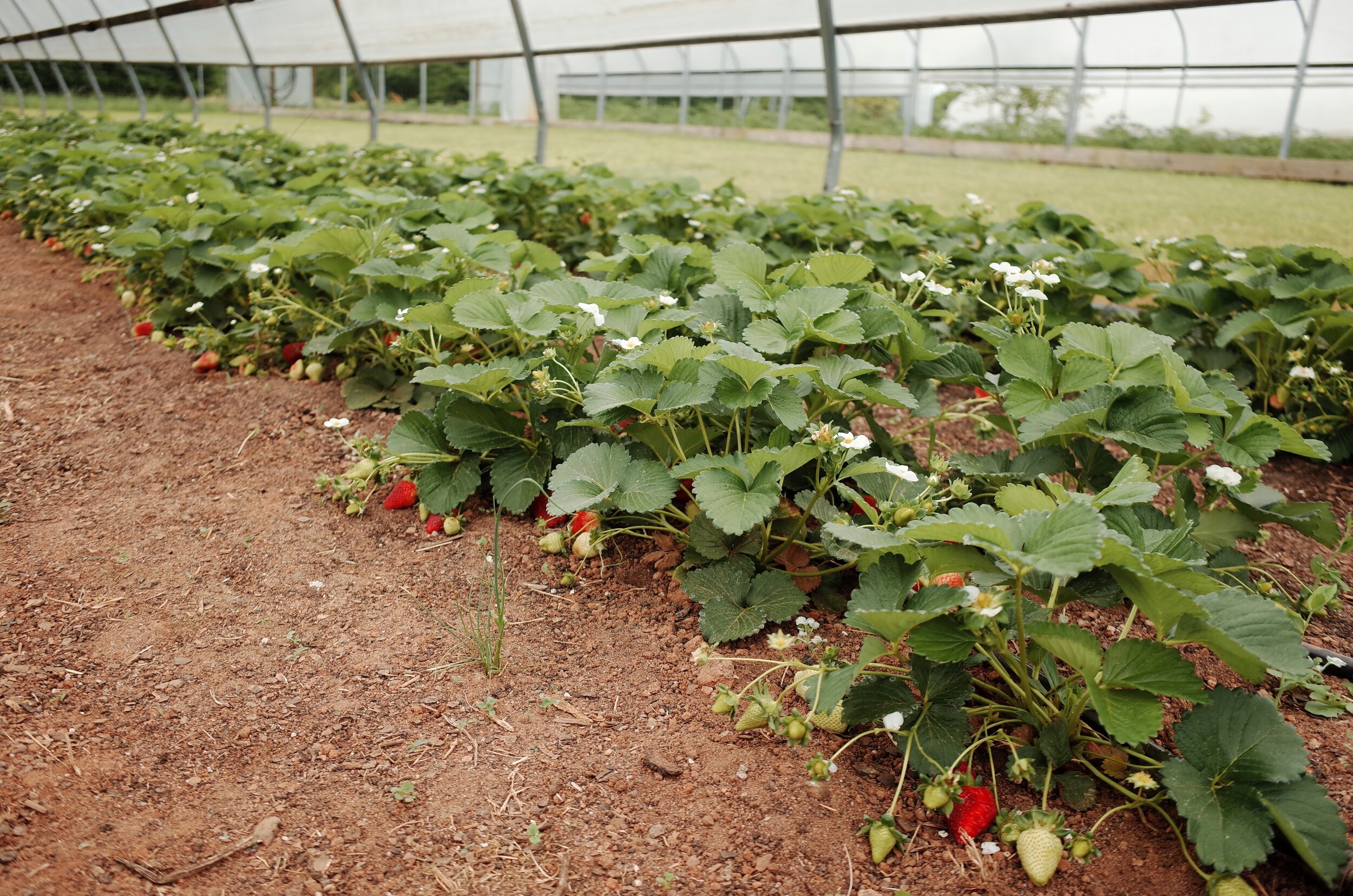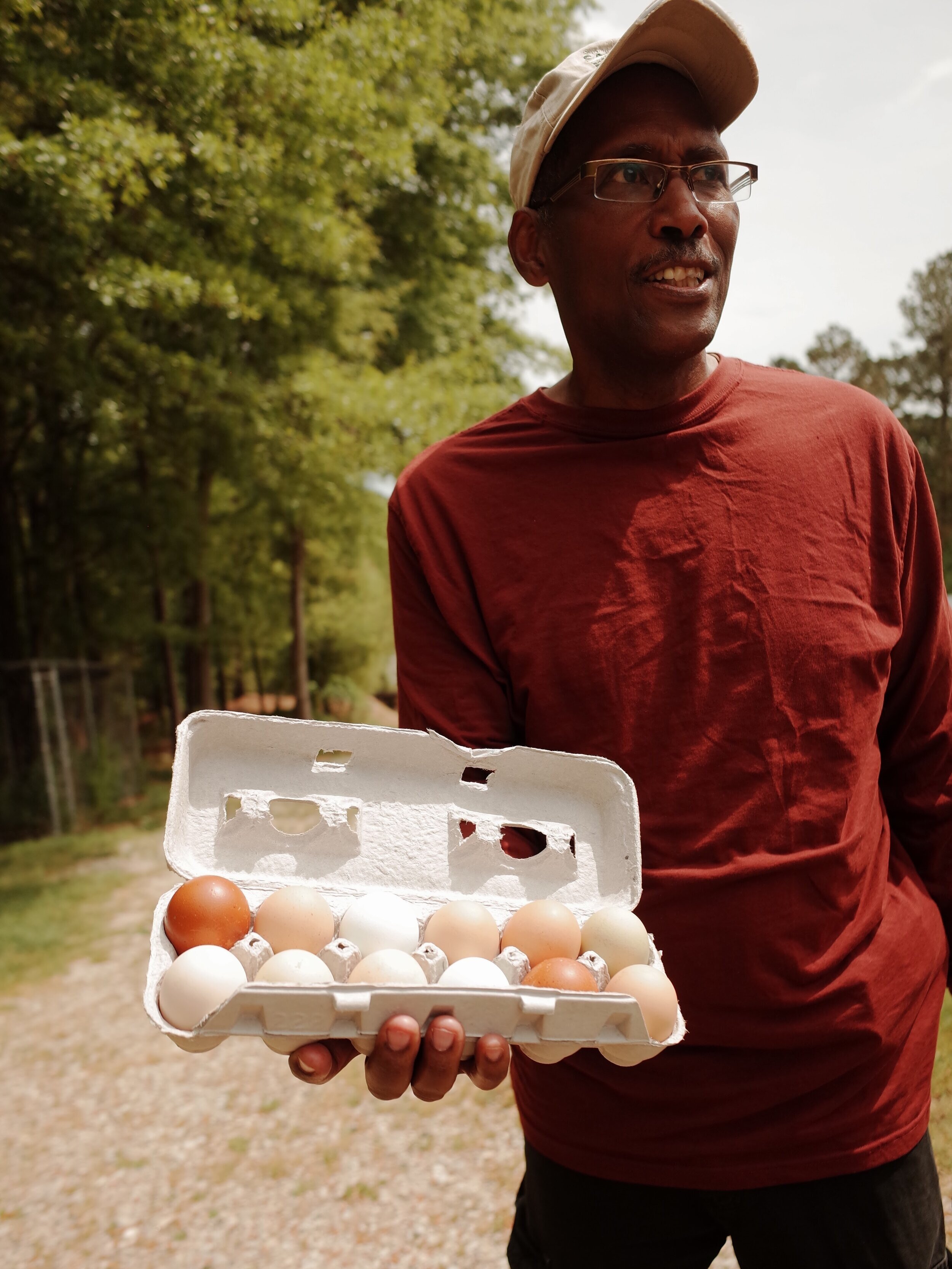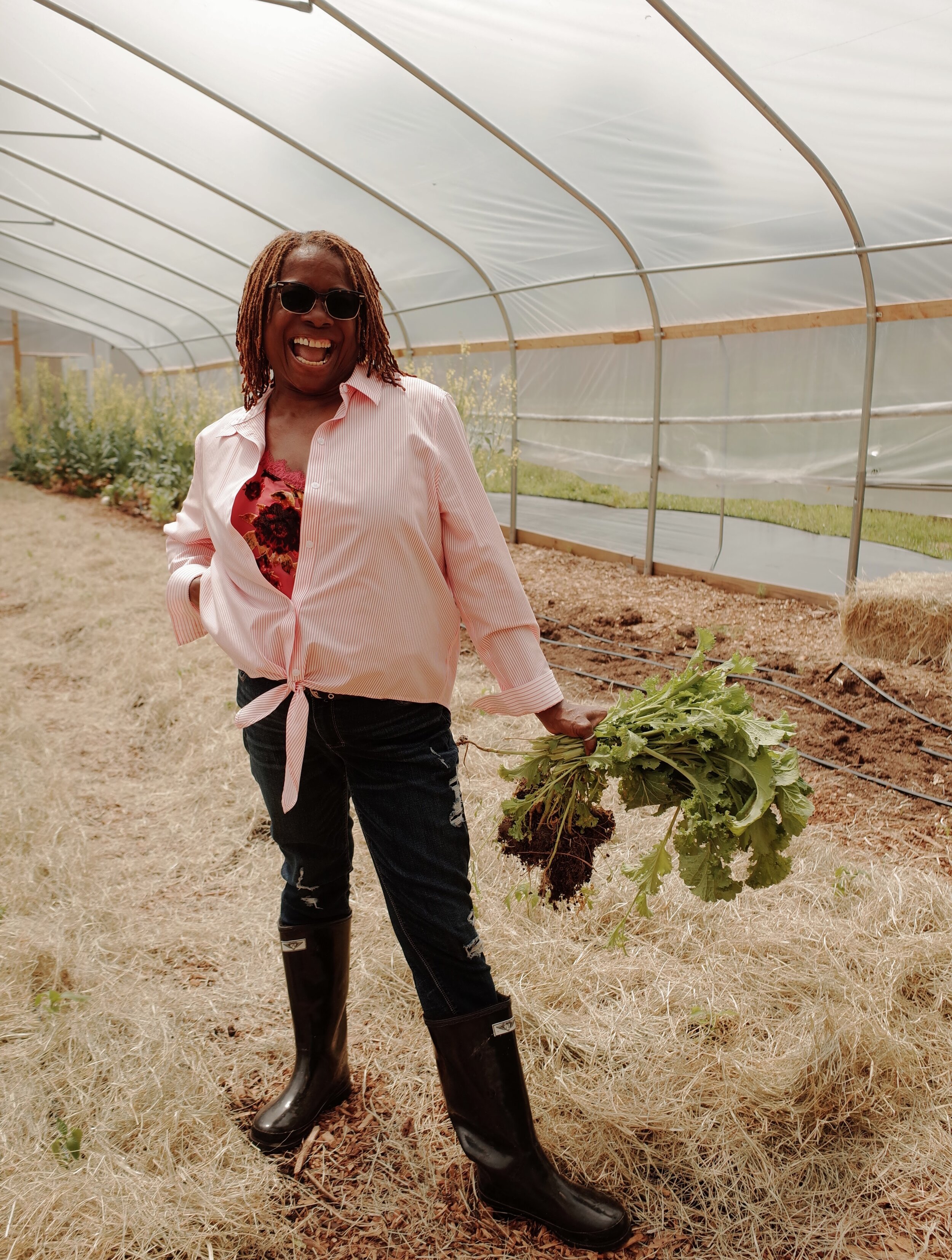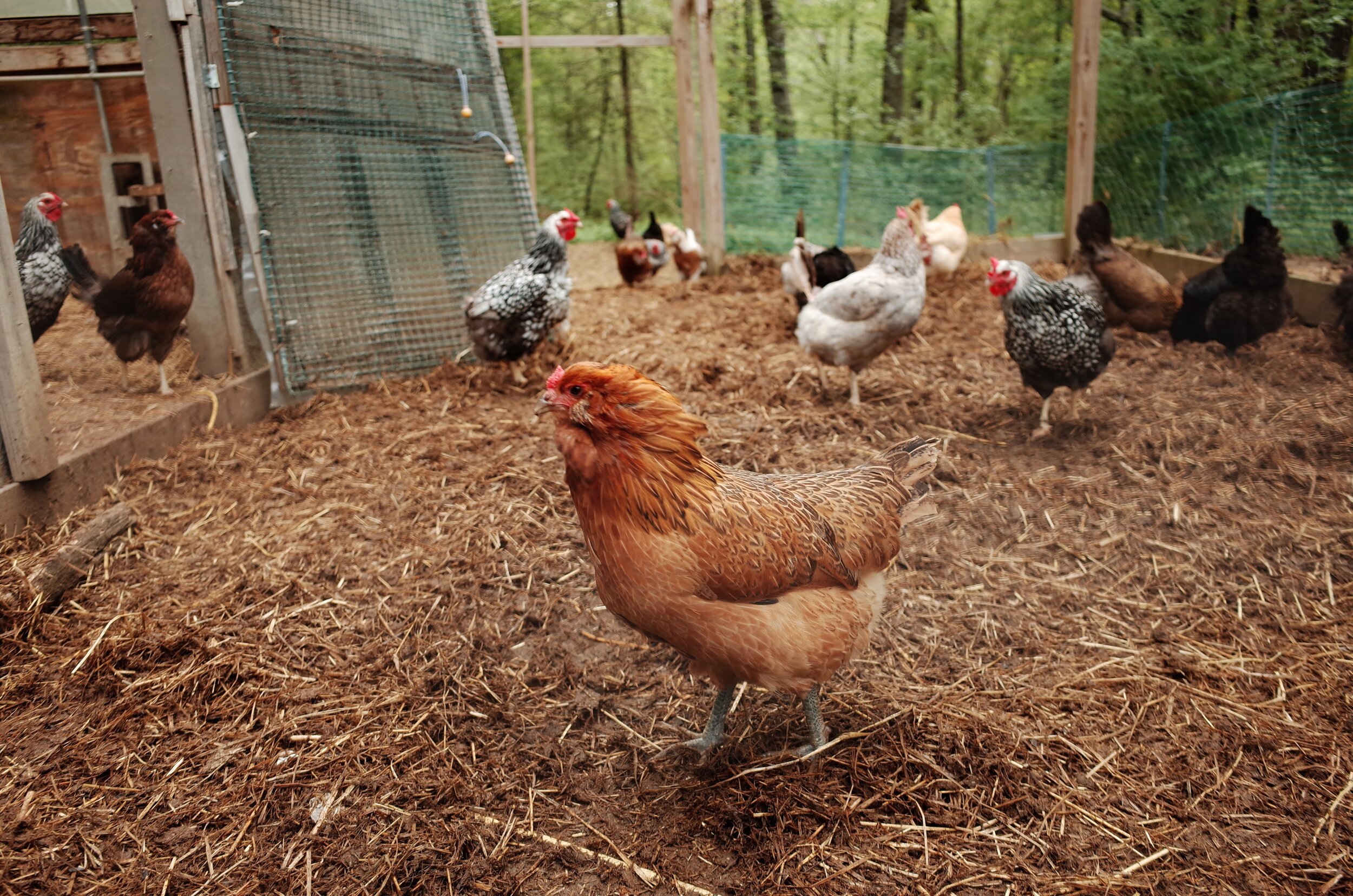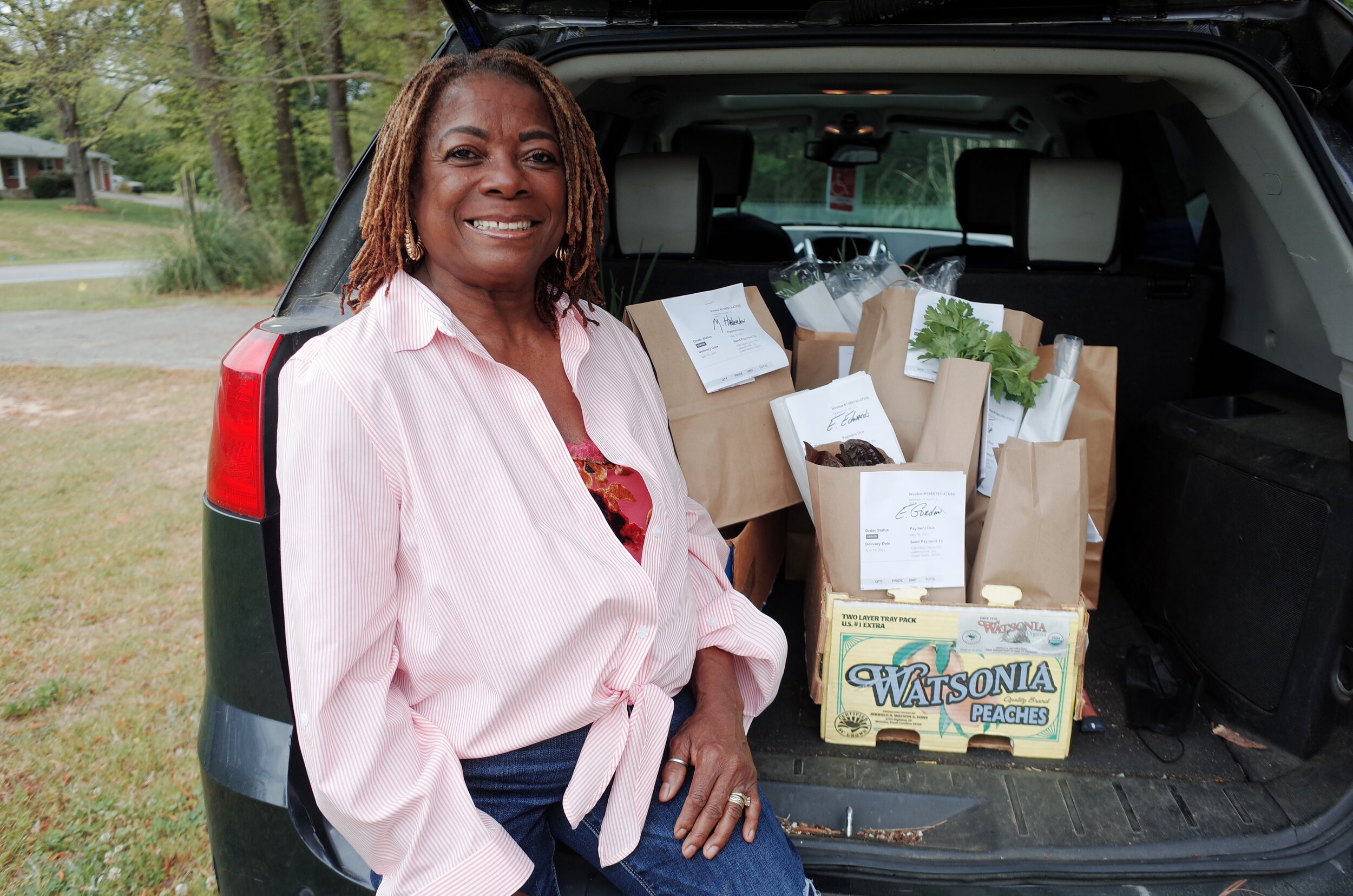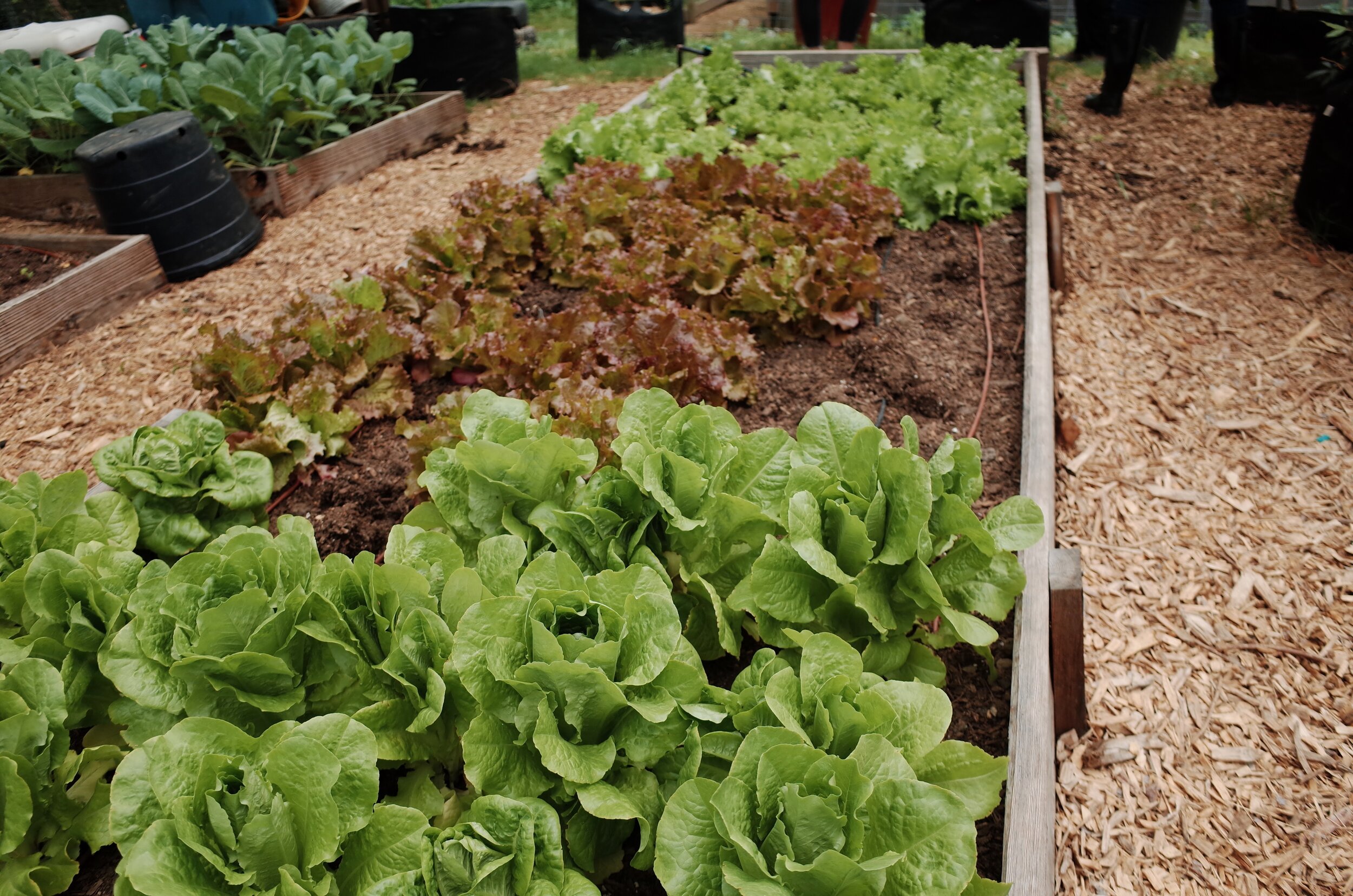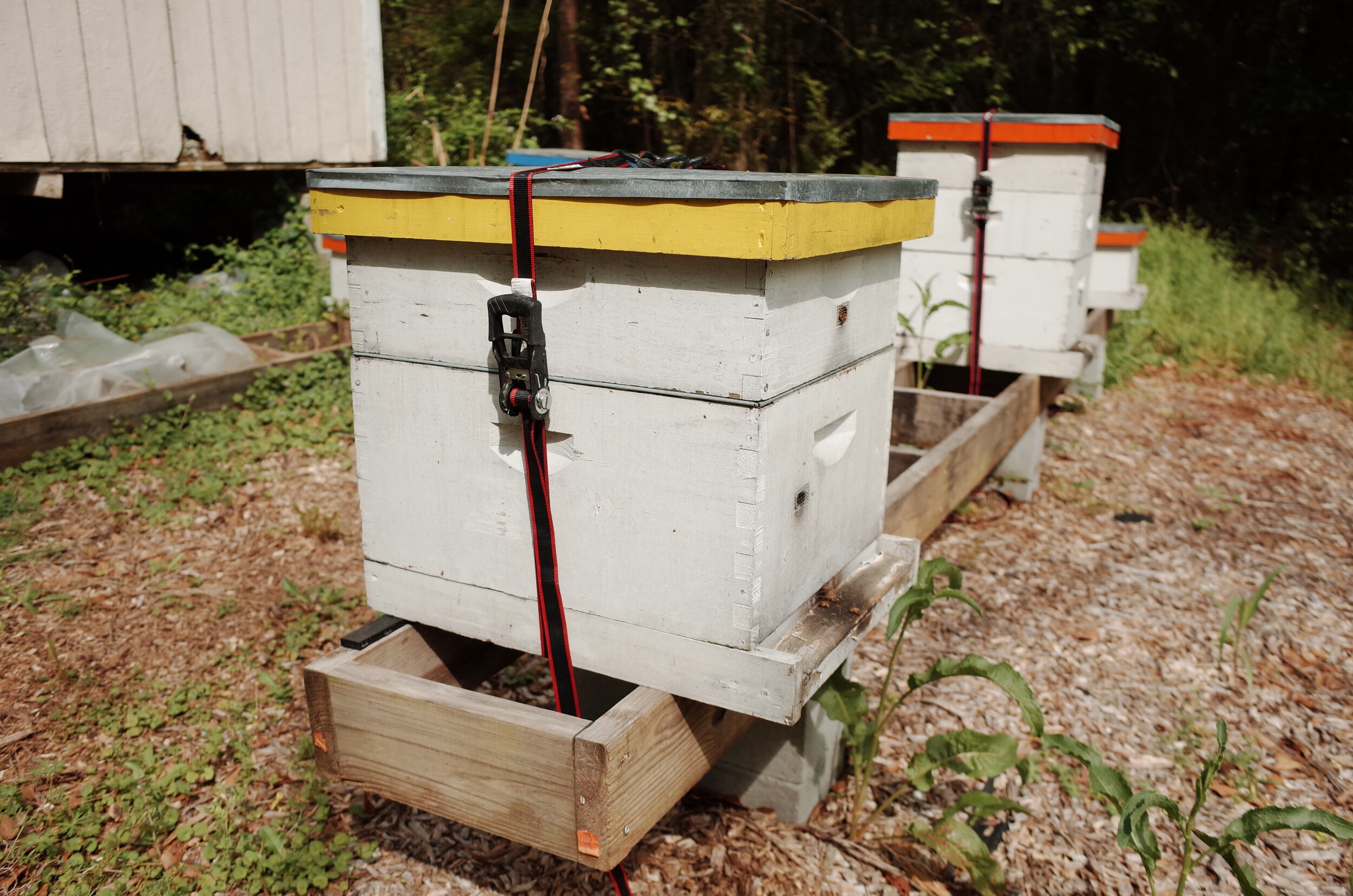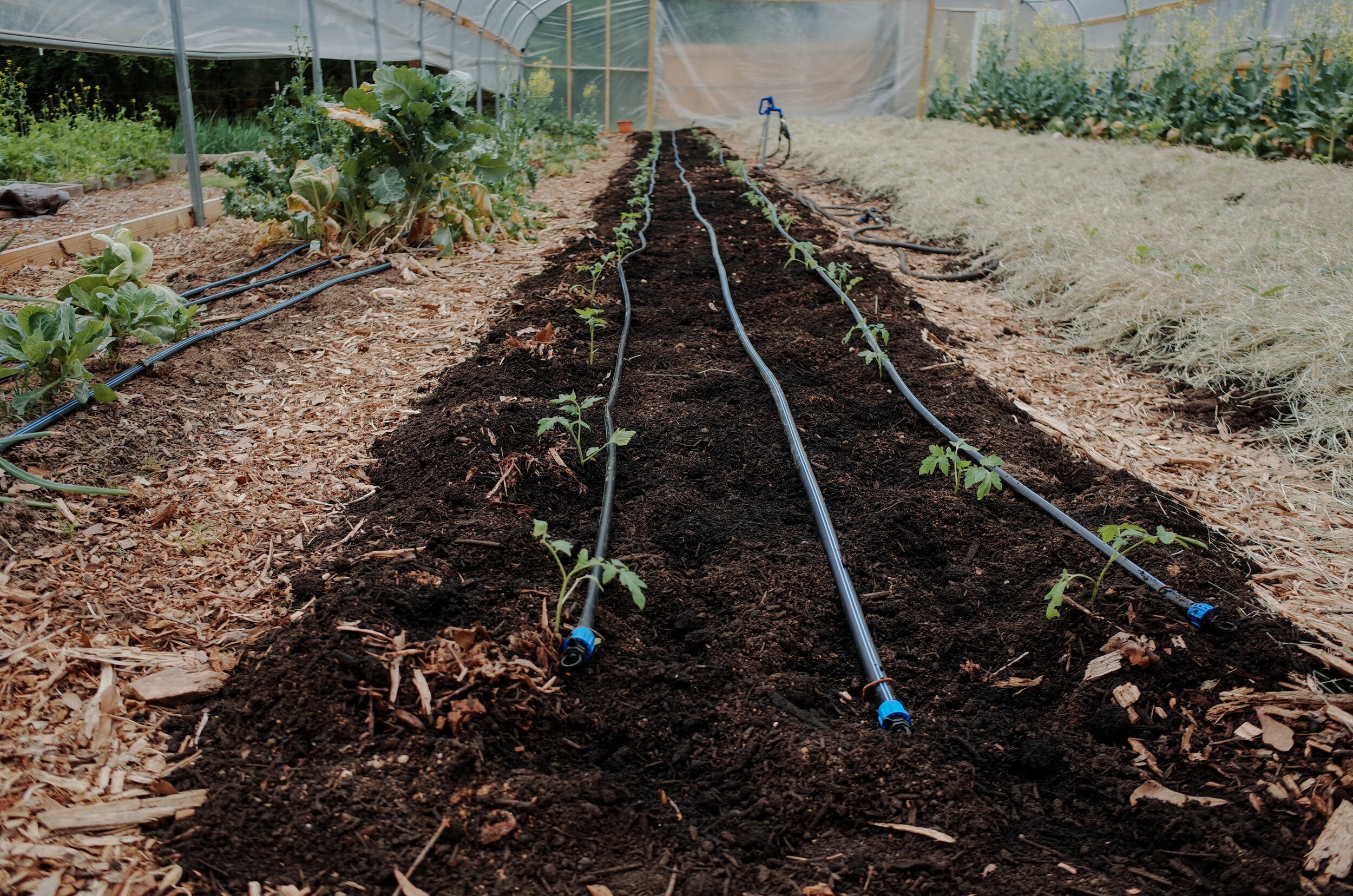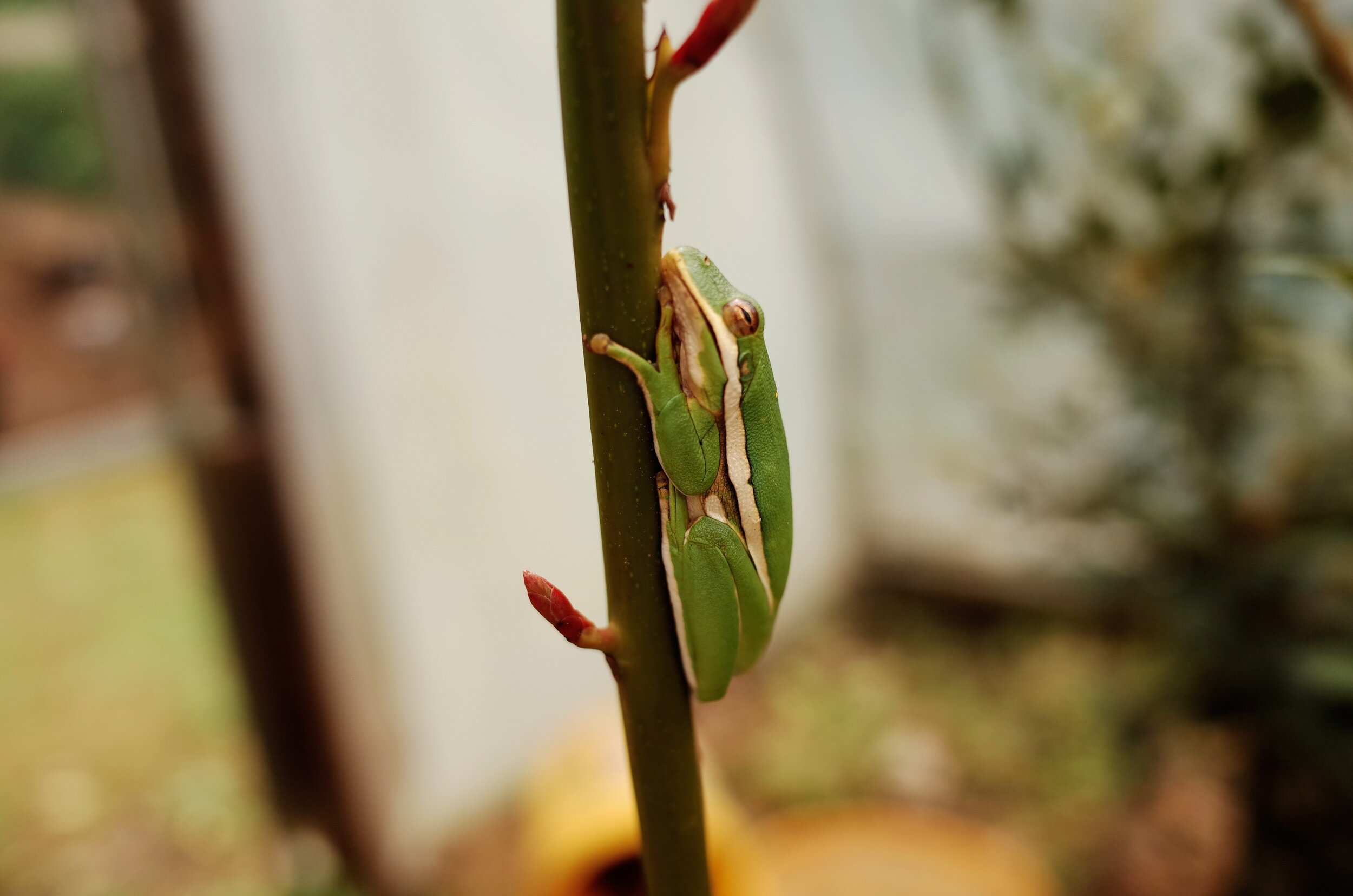The 2024 Barbara Petit Pollinator Award Winner is Cashawn Myers, cofounder and Executive Director of Helping Africans By Establishing Schools and Homes Abroad (HABESHA) INC. for his impactful work in promoting sustainable agriculture through education and advocacy.
2024 Land Steward Award Winner: Julia Asherman
The winner of the 2024 Land Steward Award is Julia Asherman, owner and operator of Rag & Frass Farm, who we are thrilled to recognize for her steadfast commitment to organic farming and soil conservation. Her Certified Organic farm is celebrated for its diverse offerings including heirloom seed production, specialty watermelon, cut flowers, and sugarcane syrup. Through innovation and dedication, Asherman has become a model for sustainable farming in Georgia.
2022 Barbara Petit Pollinator Award Winner Robby Astrove
By Mary Elizabeth Kidd
Mary Elizabeth is Georgia Organics’ Director of Communications
All photography by Ginger & Carrot Productions
The Barbara Petit Pollinator Award is named in honor of Barbara Petit, a remarkable community food advocate who served as Georgia Organics' past president. This award acknowledges individuals who are successfully advancing—pollinating—Georgia Organics' key tenants: farmer prosperity, healthy soil, and resilient communities.
The 2022 Barbara Petit Pollinator Award winner is Robby Astrove, Preserve Manager at the Davidson-Arabia Mountain Nature Preserve and the so-called “Johnny Appleseed” of Atlanta.
“Robby is what I’d call a ‘creative instigator.’”
Georgia Organics’ President & CEO Alice Rolls continues, “wherever he goes, he brings charisma, a smile, and a giving spirit.”
When asked what drives his creative and connective work, Robby Astrove cites curiosity as one of, if not the key ingredients in his life and career, even from an early age. “Even as a little kid I was always looking out the window,” he says.
Robby grew up in South Florida, playing outside and developing an early understanding of the ecosystems in his own backyard. “I can remember in the fifth grade we took a field trip to the Everglades and I was captivated by it. Not just the ecology, but also the freedom of learning in that space; the fact that we could be ‘in school’ and outdoors.”
His love of the natural world only grew in high school and college. He jokingly references his high school science fair project on the “Fire Tolerance of the Silver Palm,” which read more like scientific research than homework. In college, he charted the course for a new interdisciplinary degree in Florida State University’s School of Geography. His subjects covered city planning, hydrology, native plants and more.
The Florida Everglades and the Kissimmee River served as a natural home base for Robby. This was the site of his first “lightbulb moment” on ecological transformation; it was the topic of his 50-page college paper and was the place his career as an ecologist and educator took root. His first job was on the Kissimmee River where he provided topographical data that would eventually lead to the restoration of the river. He returned to the Everglades watershed again after pursuing a graduate degree from Western Washington University. In this role Robby planted cypress and pond apple trees with K-12 students in Lake Okeechobee. All told, he served as an educator, survey technician, tree planter, and researcher for non-profits, universities, and environmental consultants in this formational stage of his career.
Whether attending conservation conferences or educating Everglades visitors, Robby noted a gap between the urgent concerns of environmental scientists and the average person’s awareness and understanding of the current threats to the natural world and how anyone can affect change in conserving our natural resources.
Within this space between science and citizen action, Robby recognized his role as a translator or bridge for systems change. “If behavior change doesn’t happen, species disappear.”
In 2007, Robby relocated to Atlanta to become an Education Coordinator at Trees Atlanta, directing youth and adult programs on urban forestry restoration and environmental education. From there, his success as an Atlanta transplant in the conservation and local food movement would only grow exponentially.
His lasting impact on Georgia’s food system and environment would only be cemented as he had founding and early roles in the Atlanta Local Food Initiative (ALFI), the ALFI Incredible Edible Fruit Tree Sale, The Orchard Project, and Concrete Jungle. He continues to serve as one of the city’s finest foragers and educates thousands of visitors in his primary job as Preserve Manager at the the Davidson-Arabia Mountain Nature Preserve.
“Robby has been a perennial champion in Georgia's good food scene and has led workshops for Georgia Organics and numerous other groups and communities over the past 15 years. If Georgia Organics recognized Robby, people would come out of the woodwork to join with us and celebrate him because his spirit and passion move people and his track record is undeniable.” concludes Alice Rolls.
Read more about Robby’s impactful Atlanta work here and here and here, but first, enjoy this short conversation with this year’s Pollinator Award winner, including his memories of the award’s namesake, the late Barbara Petit.
Georgia Organics 2022 Pollinator Awardee Robby Astrove with 2021 winners Gwendolyn and Brennan Washington of Phoenix Gardens. Photo by Jenna Shea Photojournalism.
How did you bridge the space between environmental education and Atlanta’s local food movement?
Around the time I came to Atlanta, I started seeing that the food movement around this time was almost one-upping the environmental movement, even tackling issues of justice and equity. The local food space felt more approachable and that it could make a difference. This was reinforced by seeing the success of folks like Erin Croom establishing Georgia Organics’ Farm to School program and Georgia Organics growing as an organization.
Fruit trees really were the bridge between the environment and food spaces. While I was planting trees through Trees Atlanta, I got close to Ebrima Ba in the West End, who created the “Food, Clothing, and Shelter” documentary, and he advised me to start planting fruit trees instead; people were hungry.
Where will Robby Astrove be in 10 years? And what is your hope for a future Atlanta and Georgia food system?
I don’t have a crystal ball, but one thing you can count on is I’ll still be planting. I joked with a friend the other day that if ever I stop planting, they should come and shake me, something is wrong.
As for the future Georgia food system, I definitely hope we have a different food system than we do today. I want to see farmers and growers more respected, but not only that, better cared for, both from inside and outside our industry. They need to be seen and revered more as mission critical members of our society.
I also hope that consumers' choices change. And eventually, of course, policy.
How does your current work feed into this future vision?
I see my role as multipronged. I’m an educator, a connector—a cross-pollinator, like this award—and I finally feel like I carry some influence in this movement, like people can listen to me. This is also where mentorship comes in. I’ve spent a lot of time seeking out elders, mentors; I hope I can be a mentor, no matter what age folks are, I want to make sure we’re all carrying the torch forward.
You shared in your awards video that Barbara Petit (see below), after whom this award is named, was instrumental in what you’re doing today. What are a few things/lessons you learned from her?
My memories of working with her were really about witnessing her leadership and how she brought people together...She was someone with vision and incredible drive. I have so much love and respect for her. She is really who gave me the blessing, the head nod, to start the orchard project, and I was down to do it.
It was Barbara who directly told me: ‘don’t stop planting.’ And that’s my plan.
To hear more from Robby and learn more about the Barbara Petit Pollinator Award, click below.
RELATED STORIES:
2022 Land Steward Award Winner Juan Carlos Díaz-Pérez
By Mary Elizabeth Kidd
Mary Elizabeth Kidd is Georgia Organics’ Director of Communications.
Georgia Organics created the Land Steward Award in 1997 to recognize and honor an individual or individuals contributing significantly to the organic agriculture movement in Georgia and demonstrating commitments to key tenets of organic agriculture, including soil fertility and biodiversity.
The winner of the 2022 Land Steward Award is Juan Carlos Díaz-Pérez, a Professor in the Department of Horticulture at the University of Georgia College of Agricultural and Environmental Sciences (UGA CAES), located in Tifton.
In late June 2022, we recognized Juan Carlos and other 2022 award winners with a celebratory farm gathering. Today, we’re sharing a Q&A with Juan Carlos along with his Awards Video. And, considering his recent feature by the team at UGA CAES (read at bit.ly/ugajuancarlos), here, we focus on what inspired and drives his work today.
2022 Land Steward Award is Juan Carlos Díaz-Pérez accepts his award from 2021 Land Steward winner Chris Jackson of Jenny Jack Farm. Photo credit Jenna Mobley Photojournalism.
While Juan Carlos Díaz-Pérez has impressive credentials—B.S. in Agriculture & Plant Science (University of Guadalajara), Masters and Ph.D. degrees in Plant Physiology (University of California, Davis), author/contributor to numerous studies—to meet him, one is struck by his kind, energetic, and engaged countenance.
Juan Carlos’ work has significantly impacted the proverbial field of sustainable agriculture. Georgia Organics' Director of Advocacy and former Farmer Services Director Michael Wall shares: "Juan Carlos Díaz-Pérez has been a patient, persistent force of progress for organic growers for decades. He is performing organic research longer than anyone else in Georgia and has advanced cultural and technical approaches from his experimental fields to wide adoption among organic diversified vegetable growers across the southeast.
Wall cites an example of his decades-long pioneering work: experimenting with and proving the validity of plasticulture as a means of weed suppression, individually extolling its virtues to growers. Plasticulture is now recognized and implemented as an important tool used by organic and even some non-organic growers across the South.
Juan Carlos also leads research into organic fertilization and cover crops to improve soil quality. He also utilizes cultural techniques to deal with emerging pest pressures created or exacerbated by climate change, including the dreaded whitefly.
Put simply, says Wall: “Juan Carlos has the kind of tenacity it takes to move the needle from the inside of a flawed system.”
“I have Native American, Indigenous heritage and have always had a lot of respect and appreciation for my ancestry, especially relating to Native Americans’ love and respect for Mother Nature and the soil; they are my masters, and I always keep that in mind when I do my work in sustainable agriculture.”
Díaz-Pérez developed a love and understanding of plants early, from the garden and fruit trees in his family’s backyard in Guadalajara, where he was born and raised. As a college student, he developed an interest in vegetables from a next-door neighbor, a Spanish immigrant escaping World War II, who was a vegetable crops small farmer.
As a student, he first noted the harmful effects of conventional agriculture practices in his community, as his farming neighbors shifted away from ancestral, Indigenous farming practices to adapt to the modern marketplace. This first-hand observation of the impoverishment of the soil sparked his passion for researching and understanding how one can grow food while respecting Mother Nature.
Juan Carlos was a professor, scientist, and horticulture writer in Mexico when he first met UGA representatives at an ag conference in the US and learned of the CAES job opening. It wasn't until he returned to Mexico that the value of the new opportunity sunk in. And just in time, too, the application deadline was for the next day.
He gathered and overnight shipped his application to Tifton, and the rest is history.
Photo credit Ginger & Carrot Productions
What is your advice to organic farmers, perhaps who are just getting started?
My advice is that they must love their land and love their work. These farmers should be aware of new technologies and practices, but, very importantly, they should know the market and their customers.
How does the American university system differ from that of Mexico?
There are many similarities between the Mexican university systems, especially in the field of plant sciences research. You have to struggle a lot. In Mexico there are fewer resources at your disposal, so you have to be flexible to be able to do a lot of things. It’s not perfect here in the US; it’s still hard to find the resources and support for this type of research, but it is better.
Photo credit Ginger & Carrot Productions
How does mentorship factor in your work? Especially as it pertains to international students?
In my lab and my work, I want to give opportunities to all kinds of people.
Whenever I get a student from another country, especially from different cultures, I give them every resource to help them feel comfortable and thrive. I had to go through the adjustment process by myself, so I know it’s not easy.
How does that commitment play out in other areas of your life?
Right now, I am part of a committee, a UGA Tifton campus International Committee, and our goal is to help new students feel comfortable in the Tifton community. I have also been involved in the Georgia Latino Alliance for Human Rights (glahr.org/), which addresses issues of immigration and supports individuals in incarceration. For around five years or so, I was also active in another similar group in Tifton providing moral support like money for phone calls and clothes.
What propelled your activism work?
Being in South Georgia, I’m in touch with so many people, especially within the farming community. The vast majority of farmworkers in this area are from Mexico. We interact at church and go to parties together; we are a community. As a result, I saw so many of the challenges they face, especially related to the VISA program.
I try to help these growers get established locally. Some have purchased land and continue to grow their farm business. One student-worker who I got to know and work with at the local community college has gone on to be a successful farmer in the Tifton area.
How does farming factor into your personal life? And how do you unwind?
At home, I have figs, citrus, and peach trees, similar to when I grew up. Some of these were established in our front yard to encourage sharing!
To relax, I enjoy Netflix as well as playing the guitar, reading, and playing tennis.
Considering your deep knowledge of food, do you enjoy cooking?
I love cooking! At home, we eat a lot of Mexican food. Mexican and a fusion of other cultures’ cuisines. I like to mix things. I’m a lover of the world. And nutrition is very important. I believe good food has to be nutritious and appealing.
What legacy do you hope to create?
I hope to share the love of the land and the importance of stewardship. Both of these are really important, and we must pass this knowledge along.
Enjoy this video on our 2022 Land Steward Award Winner created by Ginger & Carrot Productions:
To learn more about Georgia Organics, visit georgiaorganics.org, and follow them on social media @GeorgiaOrganics and at facebook.com/GeorgiaOrganics.
2021 Land Steward Award Winners: Chris and Jenny Jackson of Jenny Jack Farm
By Mary Elizabeth Kidd
Photos by Kayla Williams
In 1997, the Land Steward Award was created by Georgia Organics to honor an individual or individuals who have contributed significantly to the organic agriculture movement in Georgia. The Land Steward Award recognizes the farmer with significant commitments to the tenets of organic agriculture, including soil fertility, biodiversity, and more.
This year's Land Steward Award winners are
Chris and Jenny Jackson of Jenny Jack Farm in Pine Mountain!
Celebrate Chris & Jenny on Thursday, May 27. Tix: georgiaorganics.org/awards.
Chris and Jenny embody the meaning of this award through their dedication to sustainable scaling, a cared-for team, community connection, and, of course, fostering a better environment through soil health and organic growing practices.
Listen to the Jacksons on Georgia Organics' podcast the Atlanta Foodcast!
What do you hope your lasting impact will be?
For Land Steward Award winners Chris and Jenny Jackson, they thoughtfully respond that they aim to be "a type of nourishment to this land and the local community that surrounds, supports, and encourages us."
Meeting the couple at Jenny Jack Farm in Pine Mountain, it’s evident that they are well on their way to enacting this legacy. On their farm, with two young children in tow, it’s hard to miss the fulfillment and groundedness they exhibit; a state of being for which so many strive…but which only comes with hard work, committment, and love of the land.
Chris and Jenny are Georgia natives and University in Georgia alums who met, fittingly, outside Athens' iconic 40 Watt Club. Shortly after graduation, marriage, and entry jobs in education and gardening at Callaway Gardens, their interest in full-time farming blossomed.
Crucial factors fueled the desire to farm full-time: "…it gave us the opportunity to have a little more dominion over our daily lives, the gift to work alongside each other and the great outdoors, and the work itself provided our bodies and minds with the right amount of exercise."
To grow this passion, the couple set off to work on three farms in Hawaii via WWOOF: World Wide Opportunities on Organic Farms. Upon their return, they apprenticed at Glover Family Farm in Douglasville with mentors they cite as integral to their path: "Skip and Cookie offered us experience, connections, and a launching pad into our own farm business."
Throughout their journey, the Jacksons have prioritized growing food naturally. Both for their personal eating preferences and the knowledge that the market existed (and has continued to thrive) for food grown organically.
Today, Chris and Jenny Jackson are in their 15th year of intensive farming with a team of full- and part-time farm staff and their own very young farmers: daughter, Tulsi, and son, Amos.
Jenny Jack Farm lies on about 3.5 acres in Pine Mountain, where they grow Certified Naturally Grown fruits, vegetables, herbs, flowers, and microgreens, as well as spring transplants and medicinal tinctures. The property, some 150 acres in total, is the home where Jenny grew up. "Her parents have generously allowed us to integrate our farm enterprise into their lives, giving us access to 2 beautiful buildings along with use of the land," Chris adds.
Even during the pandemic, their business has thrived thanks to an almost 200-member CSA and an on-farm store. While the on-farm order pick-ups have shifted from so-called "bucolic" gatherings to a COVID-safe drive-through, their engagement with the community has never waned.
Our conversation with Jenny and Chris about their path in sustainable farming follows:
What is your WHY in agriculture, generally? What motivates you to continue doing what you do...?
Farming is not just one thing; the tasks and the momentum are ever-changing. Farming asks us to do things we are not necessarily comfortable doing, and we have to be pretty good at each for the whole enterprise to keep moving forward. The farm is never finished, it's this imperfect living organism always shifting, and we farmers come alongside and reverently abide in the evolution. I think that's why farming is so attractive because we never, ever feel like we have mastered our work.
Besides the fulfillment we find in doing this kind of work, the need for fresh, naturally grown food is only growing, and we want to help provide for our community of supporters.
What are a few of the hurdles you've overcome in your career?
We've been fortunate that we have not experienced any major weather damage, our bodies have held up so far, and even in years when we experience some crop loss, other crops pull us through. However, adding two babies to the already demanding role as farm owners and managers has been challenging, to say the least. We are thankful that we waited until after our farm was established before adding additional humans to the mix. We have found that even with the help of family and babysitters, we are operating at the equivalent of one very full-time farmer as opposed to two very full-time farmers. This is not a hurdle we have overcome, but one we navigate daily; it's one part insanity and one part the most beautiful thing in the world.
How has mentorship factored into your work, and who are some folks you have mentored who have continued to farm?
We operated our farm for 12 years using our apprenticeship program as the main labor model. We would employ two apprentices each year but for a variety of reasons have recently shifted to all hourly work. We are still good friends with most of the apprentices who came through here; several of them visit us each year. I would say our perspective of so many issues in this world has been shaped and colored by these folks who have spent most of a year toiling in our soil. Some of these folks are still farming, and we all continue to learn from one another. Liz and Brian have a big vegetable operation in Mentone, AL, Rahul owns Snapfinger Farm near Atlanta, Katherine Kennedy manages Concrete Jungle, Miranda Cox apprenticed with us eight years ago and has been working with us on and off since, Micah and Katherine have a small vegetable and medicinal herb farm in Blairsville, Shana Frankel has just started Ma Rabu Farm 30 minutes down the road from us in Franklin, Ann Sharpe is running a small farm in Cincinnati, and Kelley Walton is working for a farm up near Louisville.
Did anyone mentor or inspire you in farming?
Oh sure! The Glovers, of course, were a big inspiration. Their farm's beauty, hospitality, and the size of tomatoes that their land could produce were memorable. We were inspired by Alex and Betsy Hitt of Peregrine Farm in North Carolina (they gave us a free tour of their farm on a Sunday afternoon!), Nickolas at Crystal Organics, Celia at Woodland Gardens, and Daniel Parsons at Emory, to name a few. Wendell Berry's writing gave us hope, and the Georgia Organics Conference gave us so much energy and new ideas, especially early on in our careers.
What are three factors that have gotten you this far in your farming career?
Jenny and I do a pretty good job of, as our friend Brandon says, "staying in our lane." We both have specific jobs on this farm, and while we might discuss them with one another, we do not encroach. Chris built, maintains, and repairs the greenhouse but couldn't tell you the varieties of lettuces we have started. Jenny creates the crop plan, knows proper plant spacing and how to prune tomatoes, but does not dabble in irrigation repair. Second,
We are pretty focused people with a high tolerance for physical labor, so early on in our career, we worked our way into a moderately successful farm. That strategy has since changed, and we are now doing well at spending less time on farm chores. Third, I think we make decisions quickly, and we pivot to enact those decisions quickly. While this might be a flaw in some instances, we don't spend hours and hours discussing and analyzing every little detail and filtering through all the possibilities. There's no time for that, especially with two kiddos now, so we go with the gut. Oh, and I know this is more than 3, but hiring employees took our farm to the next level, and we find great joy in being around our staff; they keep us laughing and educated on the outside world. I would also be remiss not to mention the fact that we did not have to buy the land we are farming; we lived in a friend's old house a few miles down the road the first six years of the farm. They asked for no rent, and our neighbors sold us the house we live in now for a very low price allowing us the opportunity to move it onto our farm and remodel it. So much love and good fortune have come our way...
What personal characteristics do you think lend well to you being a farmer?
Chris is a nine on the Enneagram scale. He's a peacemaker and avoids conflict, which can be a flaw but also can be helpful when managing a crew. He walks fast, is very organized, pays close attention to details, and has little fear of standing on wobbly ladders.
Jenny hates to disappoint people, so she goes to great lengths for customer service. She's also patient, steadfast, and has big love and appreciation for this land we are tending.
What's next for the farm and yall?
Hopefully, at least another 15 years as farmers. We just started saving for retirement last year, so we might be in this thing by necessity for much longer. Or maybe people will start to value collards as highly as they do bitcoin, and we can gracefully shift to whittling spoons on the front porch and taking afternoon naps. More than likely, the immediate future holds much of the same, to keep running a productive, profitable farm business and to try to be good parents who have time to play.
What does winning this award mean to you?
Well, it's definitely the most prized award we have received, and perhaps it just verifies that we're scrappy enough to keep coming back year after year. Really, the power of this award rests in the long list of good farmers who have received it. We are so grateful to be growing food in a state with so many talented, creative growers, many of whom will be recipients down the road. One of Wendell Berry's solutions to the environmental crisis we have found ourselves in is to "think small," and that's what we think this award is highlighting. We carefully tend this really small piece of earth, cooperatively grow thousands of pounds of food within the bounds of nature's guide, and then distribute all the food within 40 miles of our farm. Receiving this award 15 years into our farming career is an acknowledgment of the hard, deliberate work of both the community of microbes enriching our soil and the community of eaters choosing each week to purchase food plucked from our soil. What good fortune to make a living and raise a family right in the middle of the two!
Want to help us honor Chris, Jenny, Gwendolyn, and Brennan? You can make a contribution in their name for our award honorariums.
Join us online to meet and celebrate Chris and Jenny Jackson on Thursday, May 27, at 6 p.m. FREE for Georgia Organics members. Register at georgiaorganics.org/awards.
Listen to the Jacksons on Georgia Organics' podcast the Atlanta Foodcast!
Mary Elizabeth Kidd is the Director of Communications at Georgia Organics. To learn more about Georgia Organics, visit www.georgiaorganics.org and follow us on Instagram @GeorgiaOrganics, Twitter @GeorgiaOrganics, and at www.Facebook.com/GeorgiaOrganics.
2021 Barbara Petit Pollinator Award Winners: Brennan & Gwendolyn Washington of Phoenix Gardens
By Mary Elizabeth Kidd
Photos by Kayla Williams
The Barbara Petit Pollinator Award is named in honor of Barbara Petit, a remarkable community food advocate who served as Georgia Organics' past president. This award acknowledges individuals with exceptional success advancing Georgia Organics' mission of "Good Food for All" by spreading—pollinating—the movement throughout community life.
This year's Barbara Petit Pollinator Award winners are
Brennan and Gwendolyn Washington of Phoenix Gardens in Lawrenceville!
Celebrate Brennan & Gwendolyn - Thursday, May 27. Tix: georgiaorganics.org/awards.
The Washingtons are successful farmers and icons of ag leadership in Georgia and the Southeast; they offer an urban agriculture education-focused property that has indeed risen from the ashes and thrives, impacting countless farmers across the Southeast.
Listen to the Washingtons on Georgia Organics' podcast the Atlanta Foodcast!
"We are 'accidental' farmers."
Theirs is a story of chance—fate, more likely—persistence, and resilience. And through it all, spreading and deepening the roots of sustainable farming in Georgia and beyond.
Brennan and Gwendolyn Washington are both natives of the northeast with successful technology and customer service careers, respectively. They began as avid gardeners, even before relocating to Georgia, growing food using natural methods to feed themselves.
Soon enough, the garden began producing more than they could eat, Gwendolyn discovered the Lawrenceville Farmers Market, and the rest, as they say, is history. Well, "that, and Gwendolyn insisted that my gardening activities would have to start paying for themselves," Brennan adds.
Today, Phoenix Gardens is a thriving 2.5-acre diversified farm growing a wide variety of vegetables, fruit, and herbs and keeping a flock of laying hens. They participate in the Norcross and Tucker Farmers Markets and offer their own online market (phoenixgardens.net/).
But growing and selling beautiful food is just the tip of the iceberg for this farming couple. In their 15+ years of farming, they have had a strong influence in guiding the security and future of sustainable agriculture and have launched countless new farms along the way.
As a "pollinator" of natural food-growing practices, Brennan's role with Southern SARE (southern.sare.org/) extends the impact of their expertise and resource sharing far beyond Georgia. At Southern SARE, Brennan serves as the 1890 Land Grant Liaison and Limited-Resource/Minority Farmer Outreach Specialist. In Georgia, Phoenix Gardens is often a training ground for HABESHA cohorts and a whole host of other prospective and current farmers.
Photos by Kayla Williams
What factors have gotten them this far in their impressive farming career? "Resiliency, Passion and Love."
As a farming couple, they cite individual characteristics that meld to form a successful partnership: "Brennan has an easy-going, patient manner. He also likes to try new things and tinker with new ways of doing things. Gwendolyn is a natural people person. We call her our social butterfly and those qualities have made her really good with our customers."
Our conversation with Brennan and Gwendolyn about the heart of their work as farmers and mentors follows:
How did you select 'Phoenix Gardens' as your farm name?
Shortly after we moved into our home, we received a notice from Gwinnett County indicating that our property may be seized for a road project. After an almost agonizing year of waiting, we received a notification saying our property wouldn't be needed. Gwendolyn and I said we rose from the ashes like the phoenix and Phoenix Gardens was formed. Our name took on a deeper meeting when our home was destroyed by a fire in 2015.
Photos by Kayla Williams
What is your WHY in farming? What motivates you to continue doing what you do?
Well, first of all, we enjoy it. We have a passion for it and will continue to do it as long as we can physically. We are also deeply motivated to be a resource for new farmers, especially Black and Brown farmers. If the renewed interest in local foods continues, as we believe it will, we need to nurture new farmers to meet demand and build local communities.
What are some of the hurdles you've overcome in your career?
We've had to overcome quite a few challenges over the years. Aside from the road-building issues and the fire detailed earlier, we have had to deal with some health issues that severely hampered our ability to work the farm. Brennan had to undergo some major back surgery about ten years ago that brought us to the brink of financial ruin. The farm has presented us with very few challenges. It's been the personal issues that everyone has to deal with that have presented us with our greatest challenges as they often become aggravated when you operate a farm.
How has mentorship factored into your work, and who are some folks you have mentored who have continued to farm?
We have been both mentees and mentors over the past 16 years. We are graduates of the Georgia Organics Mentoring Program, and Brennan also played a role in helping to mentor farmers. Among the farmers we have helped: Jamila Norman of Patchwork City farms, Andrea Ness of Aluma Farms, Keisha and Warren Cameron of High Hog Farms, and Monica Booker of Keeyah Gardens. We've also worked closely with HABESHA Works to put on training programs for their cohorts and host them at our farm. Through his work with Southern SARE, Brennan has helped countless farmers and organizations all across the Southeast and the United States Virgin Islands and Puerto Rico to help grow farmers and local food systems.
Did anyone mentor or inspire you in farming?
Aside from the Georgia Organics Mentoring Program, we have benefitted immensely from the Southern University Small Farm Agricultural Leadership Program. This was a two-year experience that helped broaden our knowledge of agriculture in the Southeast and connected us with many invaluable people in helping us throughout our farming career. Equally valuable were the state and regional conferences such as those put on by Georgia Organics and the Sustainable Agriculture Working Group.
What do you hope your lasting impact will be?
We hope that when people think of Phoenix Gardens and Brennan and Gwendolyn, they will say they were solid and helpful supporters. Not only did they grow healthy food, but they also encouraged and helped other farmers to do the same. We hope we leave behind a legacy of support and outreach that people found valuable and hopefully encourages them to do the same.
What's next for the farm and y'all?
Well, we're getting close to retirement, so our plan is to transition the farm to more of an educational model and to figure out to bring in some farmers to run the operation once we head out to pasture.
Of course, we'll continue to work on important projects, among them helping to develop a new version of a southeastern sustainable agriculture regional conference increasing agricultural ties between farmers of color on the mainland and US territories, and continuing to ensure that farmers have access to the resources that can help them be sustainable for some time.
What does winning this award mean to you?
It means a lot to us. We knew and worked with Barbara Petit and appreciated her passion for local food systems. While we have done a lot of our work in the shadows, it is nice to get some recognition for the work we have done, especially Gwendolyn. We have been around as long as Truly Living Well and Metro Atlanta Urban Farm, yet we are often left out of conversations when it comes to local food system work in Atlanta and Georgia, so it's nice to have some recognition tossed our way. Winning this award means that we have helped to advance local food system work not only in Atlanta but beyond as well, and we believe that this award will help us to continue to advance this work.
Want to help us honor Chris, Jenny, Gwendolyn, and Brennan? You can make a contribution in their name for our award honorariums.
Join us online to meet and celebrate Brennan and Gwendolyn Washington on Thursday, May 27, at 6 p.m. This event is FREE for Georgia Organics members. To learn more and register, visit georgiaorganics.org/awards.
Listen to the Washingtons on Georgia Organics' podcast the Atlanta Foodcast!
Mary Elizabeth Kidd is the Director of Communications at Georgia Organics. To learn more about Georgia Organics, visit www.georgiaorganics.org and follow us on Instagram @GeorgiaOrganics, Twitter @GeorgiaOrganics, and at www.Facebook.com/GeorgiaOrganics.
















